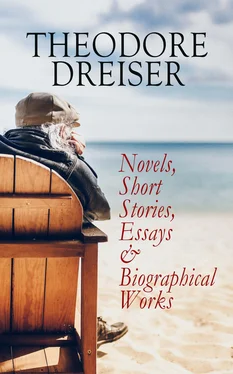“He probably could be happy,” she thought to herself, “all alone. He’s so strong.”
Mr. and Mrs. Vance kept up a running fire of interruptions, and these impressive things by Ames came at odd moments. They were sufficient, however, for the atmosphere that went with this youth impressed itself upon Carrie without words. There was something in him, or the world he moved in, which appealed to her. He reminded her of scenes she had seen on the stage – the sorrows and sacrifices that always went with she knew not what. He had taken away some of the bitterness of the contrast between this life and her life, and all by a certain calm indifference which concerned only him.
As they went out, he took her arm and helped her into the coach, and then they were off again, and so to the show.
During the acts Carrie found herself listening to him very attentively. He mentioned things in the play which she most approved of – things which swayed her deeply.
“Don’t you think it rather fine to be an actor?” she asked once.
“Yes, I do,” he said, “to be a good one. I think the theatre a great thing.”
Just this little approval set Carrie’s heart bounding. Ah, if she could only be an actress – a good one! This man was wise – he knew – and he approved of it. If she were a fine actress, such men as he would approve of her. She felt that he was good to speak as he had, although it did not concern her at all. She did not know why she felt this way.
At the close of the show it suddenly developed that he was not going back with them.
“Oh, aren’t you?” said Carrie, with an unwarrantable feeling.
“Oh, no,” he said; “I’m stopping right around here in Thirty-third Street.”
Carrie could not say anything else, but somehow this development shocked her. She had been regretting the wane of a pleasant evening, but she had thought there was a half-hour more. Oh, the half-hours, the minutes of the world; what miseries and griefs are crowded into them!
She said good-bye with feigned indifference. What matter could it make? Still, the coach seemed lorn.
When she went into her own flat she had this to think about. She did not know whether she would ever see this man any more. What difference could it make – what difference could it make?
Hurstwood had returned, and was already in bed. His clothes were scattered loosely about. Carrie came to the door and saw him, then retreated. She did not want to go in yet a while. She wanted to think. It was disagreeable to her.
Back in the dining-room she sat in her chair and rocked. Her little hands were folded tightly as she thought. Through a fog of longing and conflicting desires she was beginning to see. Oh, ye legions of hope and pity – of sorrow and pain! She was rocking, and beginning to see.
Chapter XXXIII
Without the Walled City – The Slope of the Years
The immediate result of this was nothing. Results from such things are usually long in growing. Morning brings a change of feeling. The existent condition invariably pleads for itself. It is only at odd moments that we get glimpses of the misery of things. The heart understands when it is confronted with contrasts. Take them away and the ache subsides.
Carrie went on, leading much this same life for six months thereafter or more. She did not see Ames any more. He called once upon the Vances, but she only heard about it through the young wife. Then he went West, and there was a gradual subsidence of whatever personal attraction had existed. The mental effect of the thing had not gone, however, and never would entirely. She had an ideal to contrast men by – particularly men close to her.
During all this time – a period rapidly approaching three years – Hurstwood had been moving along in an even path. There was no apparent slope downward, and distinctly none upward, so far as the casual observer might have seen. But psychologically there was a change, which was marked enough to suggest the future very distinctly indeed. This was in the mere matter of the halt his career had received when he departed from Chicago. A man’s fortune or material progress is very much the same as his bodily growth. Either he is growing stronger, healthier, wiser, as the youth approaching manhood, or he is growing weaker, older, less incisive mentally, as the man approaching old age. There are no other states. Frequently there is a period between the cessation of youthful accretion and the setting in, in the case of the middle-aged man, of the tendency toward decay when the two processes are almost perfectly balanced and there is little doing in either direction. Given time enough, however, the balance becomes a sagging to the grave side. Slowly at first, then with a modest momentum, and at last the graveward process is in the full swing. So it is frequently with man’s fortune. If its process of accretion is never halted, if the balancing stage is never reached, there will be no toppling. Rich men are, frequently, in these days, saved from this dissolution of their fortune by their ability to hire younger brains. These younger brains look upon the interests of the fortune as their own, and so steady and direct its progress. If each individual were left absolutely to the care of his own interests, and were given time enough in which to grow exceedingly old, his fortune would pass as his strength and will. He and his would be utterly dissolved and scattered unto the four winds of the heavens.
But now see wherein the parallel changes. A fortune, like a man, is an organism which draws to itself other minds and other strength than that inherent in the founder. Beside the young minds drawn to it by salaries, it becomes allied with young forces, which make for its existence even when the strength and wisdom of the founder are fading. It may be conserved by the growth of a community or of a state. It may be involved in providing something for which there is a growing demand. This removes it at once beyond the special care of the founder. It needs not so much foresight now as direction. The man wanes, the need continues or grows, and the fortune, fallen into whose hands it may, continues. Hence, some men never recognise the turning in the tide of their abilities. It is only in chance cases, where a fortune or a state of success is wrested from them, that the lack of ability to do as they did formerly becomes apparent. Hurstwood, set down under new conditions, was in a position to see that he was no longer young. If he did not, it was due wholly to the fact that his state was so well balanced that an absolute change for the worse did not show.
Not trained to reason or introspect himself, he could not analyse the change that was taking place in his mind, and hence his body, but he felt the depression of it. Constant comparison between his old state and his new showed a balance for the worse, which produced a constant state of gloom or, at least, depression. Now, it has been shown experimentally that a constantly subdued frame of mind produces certain poisons in the blood, called katastates, just as virtuous feelings of pleasure and delight produce helpful chemicals called anastates. The poisons generated by remorse inveigh against the system, and eventually produce marked physical deterioration. To these Hurstwood was subject.
In the course of time it told upon his temper. His eye no longer possessed that buoyant, searching shrewdness which had characterised it in Adams Street. His step was not as sharp and firm. He was given to thinking, thinking, thinking. The new friends he made were not celebrities. They were of a cheaper, a slightly more sensual and cruder, grade. He could not possibly take the pleasure in this company that he had in that of those fine frequenters of the Chicago resort. He was left to brood.
Читать дальше












